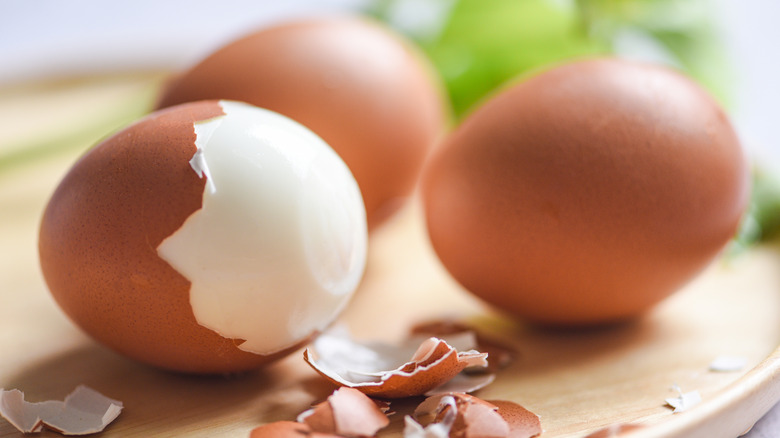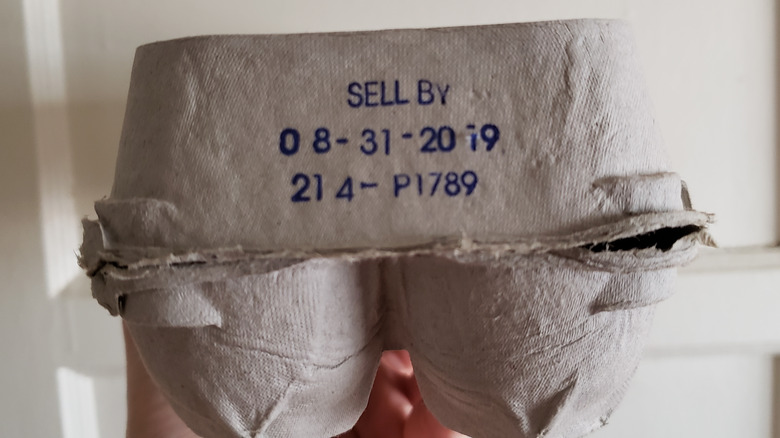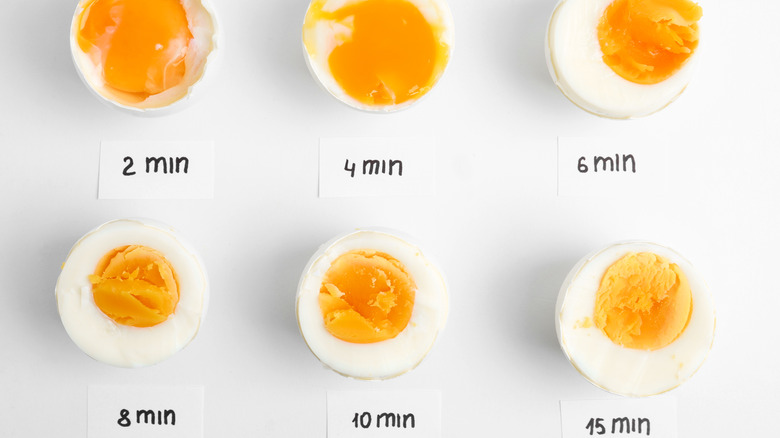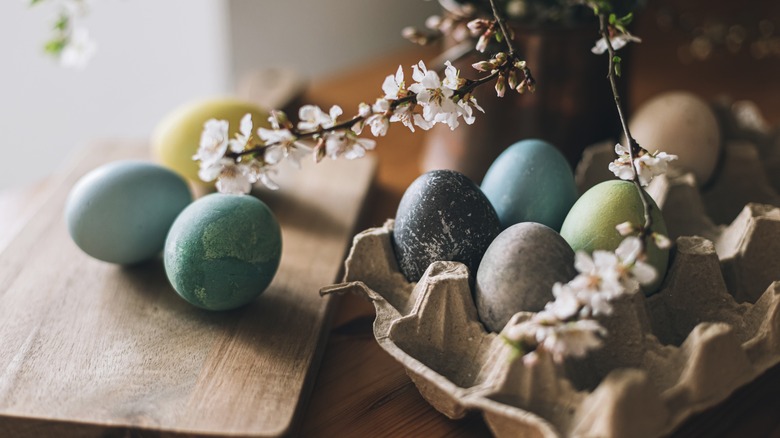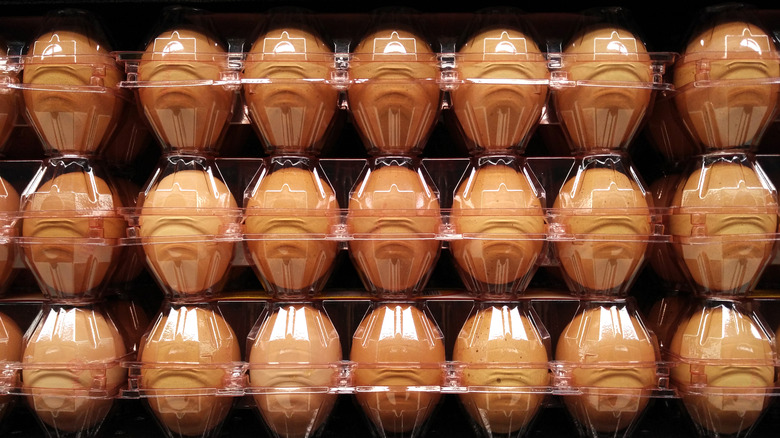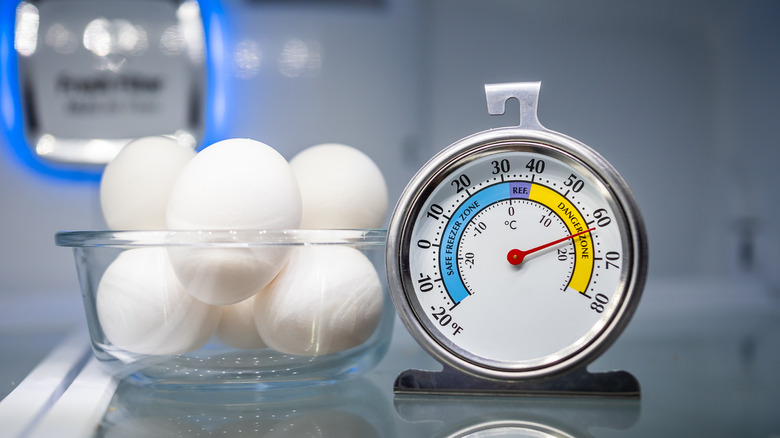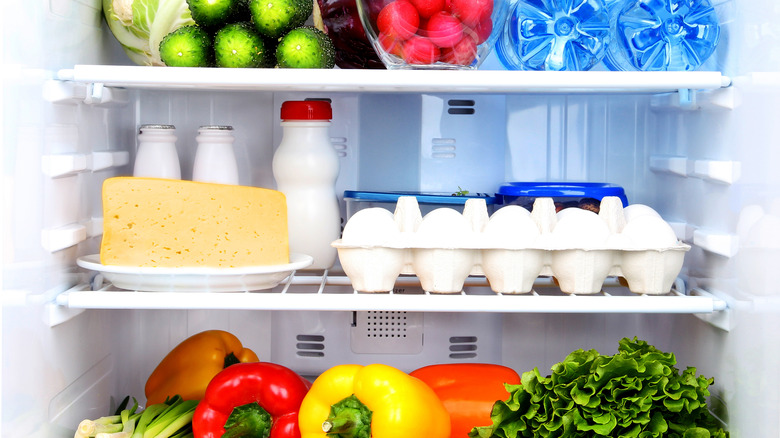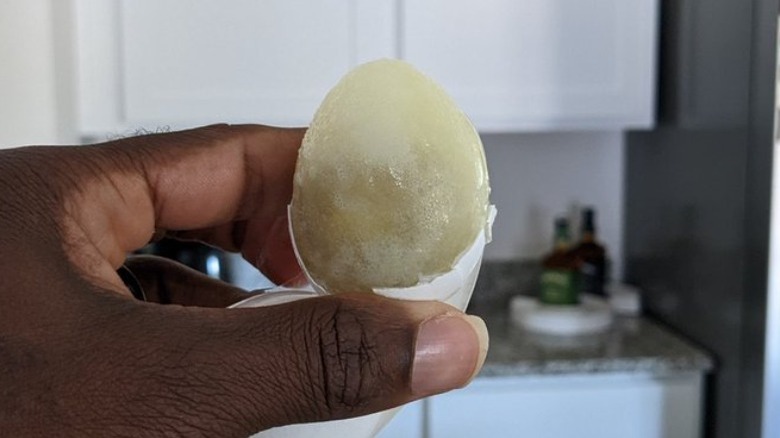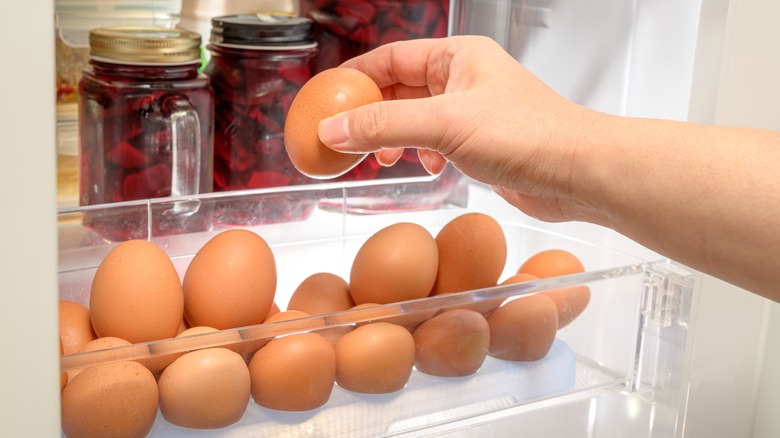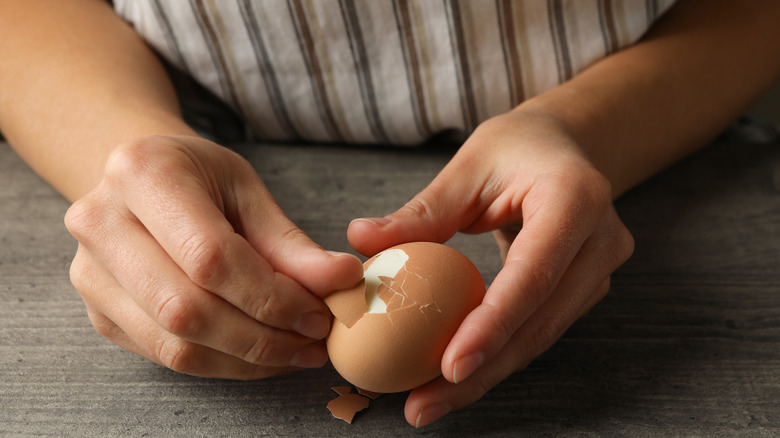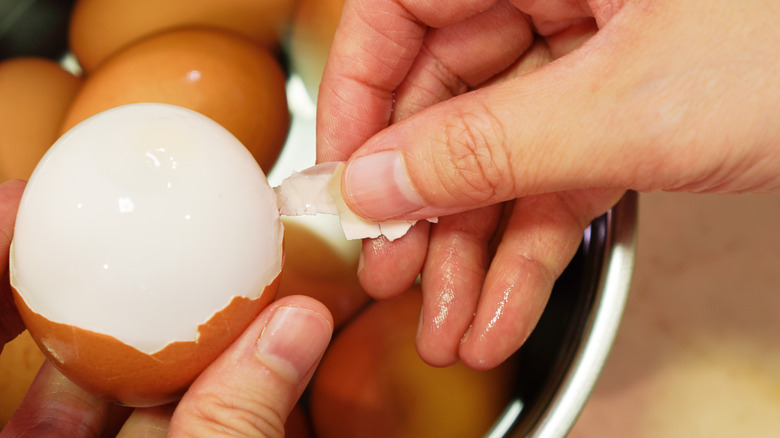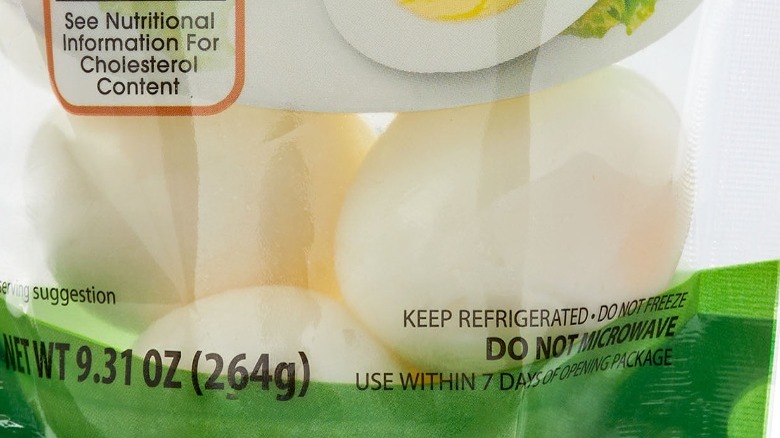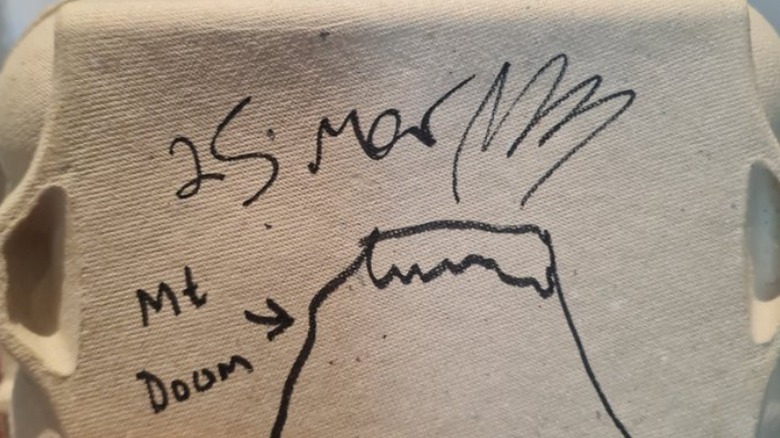13 Ways To Keep Your Hard-Boiled Eggs Fresh (& How Long They Last In The Fridge)
We may receive a commission on purchases made from links.
You can keep hard-boiled eggs fresh in your fridge for a while. However, they won't keep nearly as long as eggs that haven't been boiled. There are also a few safety precautions you must take to ensure that they remain safe for as long as they should: How long you keep them out of the fridge, how long you cook them, and the temperature at which you keep them all matter.
We have created a list of tips to follow to ensure your hard-boiled eggs stay fresh and taste their best for as long as possible. However, there is always still a chance something could go wrong, so it's important to know what to look for to tell if your boiled eggs have spoiled. Whether you boil them yourself or buy them pre-boiled from the store, we'll give you the tools to keep your eggs safe and fresh as long as possible.
1. Notice the expiration date on the eggs
Before you ever get started with the boiling process, you will want to notice the expiration date on your eggs. The USDA requires that the sell-by date on a carton of eggs can't be more than four weeks after the farmer packed the eggs into the carton. After the eggs are five weeks old, they won't taste as fresh. The longer the eggs sit in the fridge paste the sell-by date, the less fresh they will taste. Chemical changes in older eggs indeed make them easier to peel. However, if you want them to taste their best, you won't want them to get more than a week past their sell-by or best-by date before you boil them.
Even if you follow every other trick that we give you for keeping your hard-boiled eggs fresh for as long as possible, your eggs won't taste good if you use ones that are too old. So don't boil the freshest eggs in the fridge to make them easier to peel, but also don't wait until they're so old that they should have been trashed already.
2. Make sure you boil them long enough
If you plan to keep your boiled eggs in the fridge a while, you want to ensure that you're starting off with hard-boiled eggs rather than soft-boiled eggs. The yolks of soft-boiled eggs are only slightly cooked, so soft-boiled eggs only last for about two days in the fridge (per MasterClass). If you wait longer before eating them, you put yourself at risk for salmonella or other types of food poisoning.
So, if you don't intend to eat your eggs within two days, it's essential to hard boil them. When Mashed talked to chef Devan Cameron, he told us, "Large eggs need 12 minutes of cooking in boiling water if they're cold from the fridge, and 11 minutes if they're at room temperature. Small eggs will only need 10 minutes of boiling to be effectively hard-boiled." Anything less than 10-12 minutes will leave you with runny, jammy, or fudge-like egg yolks, which is not what you want. If you're making a batch of hard-boiled eggs in the Instant Pot, you'll want to cook the eggs for five minutes and wait another five minutes to open up the pot.
3. Don't allow them to sit out too long before you refrigerate them
If you have boiled eggs you plan to refrigerate, it's important to track exactly how long they sit outside the fridge before you put them in the fridge. Tracking time your boiled eggs spend outside the fridge is especially important to note during the Easter season, when you may spend extra time dying eggs and even hiding them. They should never be out of the fridge longer than two hours total in normal temperatures. However, if they're in temperatures above 90 degrees Fahrenheit, they're not fit to eat if they've been sitting out for more than an hour. The FDA says that, If the total amount of time they're left unrefrigerated is more than two hours under normal circumstances or one hour above 90 degrees Fahrenheit, you should toss them rather than put them in the fridge to eat later.
Once you've cooked your eggs, it's easier for dangerous bacteria to penetrate the shells. Keeping them at high temperatures for too long can cause bacteria on and in the eggs to grow at a rapid rate, which could potentially cause food poisoning. In fact, eggs are among the most dangerous foods if you don't pay attention to how long they've been sitting out.
4. Put them in the right type of container
Have you ever seen egg boxes for sale and wondered why people don't just use the egg cartons that came from the store? Well, when you boil eggs, it's best to store them in an airtight container. If the carton they came in has holes in it or isn't airtight, it might be a good idea to invest in a sealed egg container (especially if you make boiled eggs often). Most egg containers look a lot like egg cartons except that they're clear and the lid fits tighter. Another option is a deviled egg container with a lid. They're especially nice because they do double duty as both a holder for eggs and a holder for deviled eggs later. Just remember that you'll need twice as much space for your deviled eggs as you will for plain boiled eggs after you split the eggs in half.
While an airtight egg-carton-like container or a deviled egg container are the optimal choices, you don't necessarily have to buy something special to store your eggs. An airtight, covered bowl would work in a pinch as long as you could keep your eggs separated to prevent cracking. Nestling them in a dish towel inside the container could work well.
5. Store them at the right temperature
It's possible to keep boiled eggs out for a while if you're having a picnic or transporting them. However, the less time they stay out, the better because bacteria multiply faster on them any time they drop into the "danger zone" between 40 and 140 degrees Fahrenheit. It's perfectly safe to keep them out for a couple of hours, but once you pass the two-hour mark (or the one-hour mark if it's over 90 degrees Fahrenheit), you'll need to put them in the fridge or a cooler.
Storing your eggs at the right temperature is essential to both keeping them fresh and safe to consume. If you're storing them in the refrigerator, the FDA says they need to steadily stay below 40 degrees Fahrenheit to slow down how quickly bacteria are able to multiply outside and inside your egg.
If you transfer your eggs to a cooler or insulated bag instead of in the fridge, you've got to be careful that they stay cold enough, so packing them with a little ice or gel packs is essential. You'll also want to avoid opening the cooler or insulated bag so often that you raise the temperature inside too much. If you use ice, be mindful that you aren't creating a situation where the eggs freeze, because the texture will suffer. It's better to put the eggs in a container nestled in the ice rather than directly on it.
6. Pay attention to where they're located in the fridge
Even after you get your hard-boiled eggs into the fridge, you still need to take care that you put them in the right place to minimize Salmonella bacterial growth. Over the years, food scientists have studied what factors contribute to Salmonella growth and how to slow it down. They've found that some of the most important things you can do for egg safety are to keep your eggs consistently cold and prevent the temperature of the eggs from swinging up and down (via the Journal of Food Science).
We know that it's impossible to avoid opening up your fridge door, and that you may even leave it open for a short time. It's not uncommon to take an ingredient out of the fridge, add it to your recipe, put it back, and then finally shut the fridge door. Meanwhile, the inside of your fridge is exposed to the temperature in your kitchen. So your job is to figure out where you can put your boiled eggs in your fridge for minimal temperature change. Some refrigerators come with spaces for eggs in the door, which is fine for raw eggs. However, the door is the worst place you can put boiled eggs. Every time the door opens, it separates from the cool space inside, warming the eggs. If you have a fridge with two doors, it's best to choose a location behind the door you open less often.
7. Don't let them reach freezing temperatures in your fridge
If you let your boiled eggs freeze while they're in your fridge, you might as well throw them away. The problem is that after they thaw out, the yolk will be okay, but the egg white will become rubbery and hard to chew. Paying attention to how cold your fridge gets is essential to keeping your eggs not only fresh, but also edible.
To prevent your eggs from freezing, you'll want to make sure the temperature in your fridge stays below 40 degrees Fahrenheit without getting too close to 32 degrees Fahrenheit. The shelf closest to the freezer or ice maker may have a tendency to get colder than other areas in your fridge. Avoid putting your hard-boiled eggs on a shelf directly below or above the freezer or ice maker unless there's an extra drawer between the two sections to serve as a buffer. If in doubt, place a refrigerator thermometer on the shelf with the boiled eggs and keep an eye on it.
8. Know the limit of how long eggs stay fresh in the fridge
While it's possible to keep uncooked eggs in your fridge for multiple weeks. Once you boil them, you start a rapid freshness countdown. With the protective coating gone from the outside of the shell, it's just a matter of time before bacteria will compromise the egg. From the moment you boil them, the FDA says they will stay fresh in the fridge for a week. Luckily, this limit stands whether you peel the eggs so they're ready to eat anytime you want them or whether you leave them in the shell.
Of course, there are a few things that can compromise how long they can stay fresh in the fridge. If you left them out too long before putting them in the fridge in the first place or didn't cook them long enough, they won't stay good for a whole week. Being able to enjoy boiled eggs from your fridge for a full week depends on you following other health guidelines.
While most peeled eggs you buy from the grocery store will also say they're good for seven days after opening, you'll want to pay close attention to the packaging. For whatever reason, some packages of peeled eggs say that they're only good for two or three days after opening. To prevent food poisoning, be sure to heed that warning.
9. Don't peel them
Sure, you can keep peeled eggs in the fridge for just as long as you can keep unpeeled eggs (seven days). However, you may not want to. The American Egg Board suggests that you eat eggs the same day you peel them if you want them to taste their best. During the boiling process, your eggs lose a protective outer coating and become more permeable. While more porous, the shell can still help protect your egg from starting to taste like everything in your fridge. If you want your boiled eggs to taste as nice and fresh as possible, it's better to leave them unpeeled until you're ready to eat them.
While most packaged peeled eggs say that they're good for seven days after opening, the same isn't true for every brand. So read the label carefully. Some are only good for two to three days, so choosing peeled over unpeeled boiled eggs can sometimes result in you needing to stuff far more eggs into your face quickly. Although, we're betting that if you turned them into deviled eggs, you'd have no problem getting rid of them in one rather than several days.
10. Store peeled eggs in a bowl of water
If you buy boiled eggs from the store, they tend to come unpeeled. However, you will also notice that they come floating in water inside the bag. That's because the exterior of boiled eggs tends to dry out if you peel them and don't eat them immediately. If you have a bunch of boiled eggs sitting in your fridge, they'll start to dry out — even in a sealed container. So we suggest either floating them in a bowl of water or covering them with a damp cloth or paper towel to help keep them moist.
Since your peeled eggs will be sharing the fridge with other foods, there's a risk the water will eventually start to absorb all those odors and transfer the flavor to your eggs. Water has a tendency to pick up odor molecules in the air, even if your refrigerator isn't necessarily stinky. Thus, if you decide to float your peeled eggs in water, you will want to change the water out every day for the best results.
No matter what you do to keep your boiled eggs moist, you will also want to cover them and keep them airtight as well. Don't say we didn't warn you if you ignore our advice and end up with peeled eggs that taste like the garlic and onions in your vegetable drawer and the casserole you put in the fridge two days ago.
11. Pay attention to the packaging if you didn't boil them yourself
The easiest route to having boiled eggs in your fridge is buying them pre-boiled. However, it's also the easiest route to accidentally eating eggs that are too old. If you bought your eggs factory-sealed, they likely don't have an expiration date. Instead, they will tell you that you should eat them all within seven days of opening, or toss them.
In addition to needing to eat your opened eggs within a certain time frame, you will also probably notice an expiration date on the package. You've probably heard that it's fine to eat eggs slightly past their expiration date without a health risk. However, that exception applies to eggs that haven't been boiled yet. Once they're boiled, the clock starts ticking. For safety's sake, it's best to eat packaged boiled eggs within seven days of opening or before the expiration date on the package – whichever comes first. If the eggs expire today, you open them today, and you eat them for seven days, you put yourself at risk for food poisoning.
12. Watch out for signs they're going bad
Even if you follow all the rules for how long you can keep boiled eggs out of the fridge, the temperature to store them, and where to store them, there's still a chance things can go wrong. You absolutely don't want to get food poisoning from bad eggs. Sometimes, the symptoms of Salmonella poisoning don't show up until days or weeks later, after you've long forgotten you ate suspicious boiled eggs. If you end up sick, you'll wish you'd been a little less risky with your boiled eggs.
So what signs can give you a warning to head off food poisoning from boiled eggs? The first thing you should watch for is an abnormal texture. If the shell starts to feel chalky when you touch it, or if the eggshell is covered in slime, you should throw it away. However, there's no reason to be alarmed if you break open your egg and find that the outer layer of your yolk is greenish-grey. A greenish-grey yolk simply indicates that you cooked your egg a little too long or let it cool too slowly, causing a chemical reaction between iron and sulfur in the egg to form ferrous sulfide. This reaction can cause a slightly sulfurous smell, which you've likely smelled from boiled eggs many times before. However, if you smell the telltale scent of intensely sulfurous rotten eggs, you can trust your gut instinct to throw them away.
13. Date your eggs (no, not romantically)
You have a lot of things going on in your life, so it's not uncommon to lose track of the exact day that you boiled your eggs. That's why we suggest that you put dates either on your egg container or on the eggs themselves to remind you how long they're good. It can help you avoid throwing them away early or eating them after they're safe. If you date every egg, then you can have multiple batches in your fridge without having to remember which eggs are freshest.
Eggshells are permeable, so it's important that you write on them with something that is food-safe. The easiest thing to use is a pencil, which has no trouble marking on an eggshell and doesn't soak through to the egg like markers do. While Sharpies are tempting, they're not a good idea because they're made with chemicals you don't want to eat. If you decide to use a marker rather than a pencil, try using edible markers like the kind bakers use for coloring cookies. That way you know they're safe if they soak through to the soft part of your egg.
